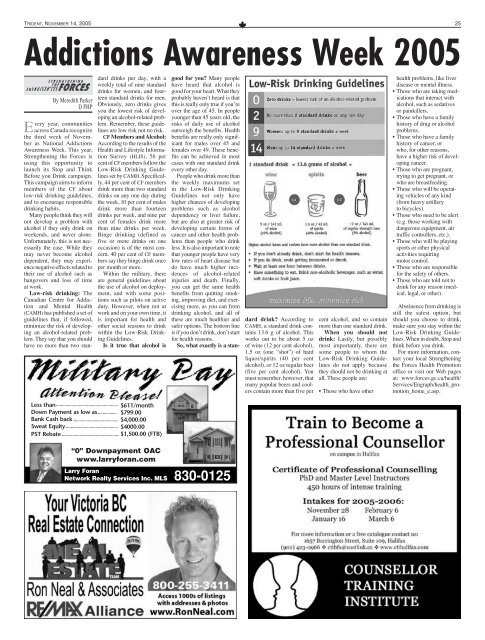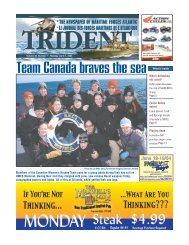Trident Nov 14 2005 - Tridentnews.ca
Trident Nov 14 2005 - Tridentnews.ca
Trident Nov 14 2005 - Tridentnews.ca
- No tags were found...
You also want an ePaper? Increase the reach of your titles
YUMPU automatically turns print PDFs into web optimized ePapers that Google loves.
TRIDENT, NOVEMBER <strong>14</strong>, <strong>2005</strong> 25<br />
Addictions Awareness Week <strong>2005</strong><br />
By Meredith Parker<br />
D FHP<br />
Every year, communities<br />
across Canada recognize<br />
the third week of <strong>Nov</strong>ember<br />
as National Addictions<br />
Awareness Week. This year,<br />
Strengthening the Forces is<br />
using this opportunity to<br />
launch its Stop and Think<br />
Before you Drink <strong>ca</strong>mpaign.<br />
This <strong>ca</strong>mpaign aims to inform<br />
members of the CF about<br />
low-risk drinking guidelines,<br />
and to encourage responsible<br />
drinking habits.<br />
Many people think they will<br />
not develop a problem with<br />
alcohol if they only drink on<br />
weekends, and never alone.<br />
Unfortunately, this is not necessarily<br />
the <strong>ca</strong>se. While they<br />
may never become alcohol<br />
dependent, they may experience<br />
negative effects related to<br />
their use of alcohol such as<br />
hangovers and loss of time<br />
at work.<br />
Low-risk drinking: The<br />
Canadian Centre for Addiction<br />
and Mental Health<br />
(CAMH) has published a set of<br />
guidelines that, if followed,<br />
minimize the risk of developing<br />
an alcohol-related problem.<br />
They say that you should<br />
have no more than two standard<br />
drinks per day, with a<br />
weekly total of nine standard<br />
drinks for women, and fourteen<br />
standard drinks for men.<br />
Obviously, zero drinks gives<br />
you the lowest risk of developing<br />
an alcohol-related problem.<br />
Remember, these guidelines<br />
are low risk not no risk.<br />
CF Members and Alcohol:<br />
According to the results of the<br />
Health and Lifestyle Information<br />
Survey (HLIS), 56 per<br />
cent of CF members follow the<br />
Low-Risk Drinking Guidelines<br />
set by CAMH. Specifi<strong>ca</strong>lly,<br />
44 per cent of CF members<br />
drink more than two standard<br />
drinks on any one day during<br />
the week, 10 per cent of males<br />
drink more than fourteen<br />
drinks per week, and nine per<br />
cent of females drink more<br />
than nine drinks per week.<br />
Binge drinking (defined as<br />
five or more drinks on one<br />
oc<strong>ca</strong>sion) is of the most concern.<br />
40 per cent of CF members<br />
say they binge drink once<br />
per month or more.<br />
Within the military, there<br />
are general guidelines about<br />
the use of alcohol on deployment,<br />
and with some positions<br />
such as pilots on active<br />
duty. However, when not at<br />
work and on your own time, it<br />
is important for health and<br />
other social reasons to drink<br />
within the Low-Risk Drinking<br />
Guidelines.<br />
Is it true that alcohol is<br />
good for you Many people<br />
have heard that alcohol is<br />
good for your heart. What they<br />
probably haven’t heard is that<br />
this is really only true if you’re<br />
over the age of 45. In people<br />
younger than 45 years old, the<br />
risks of daily use of alcohol<br />
outweigh the benefits. Health<br />
benefits are really only signifi<strong>ca</strong>nt<br />
for males over 45 and<br />
females over 49. These benefits<br />
<strong>ca</strong>n be achieved in most<br />
<strong>ca</strong>ses with one standard drink<br />
every other day.<br />
People who drink more than<br />
the weekly maximums set<br />
in the Low-Risk Drinking<br />
Guidelines not only have<br />
higher chances of developing<br />
problems such as alcohol<br />
dependency or liver failure,<br />
but are also at greater risk of<br />
developing certain forms of<br />
<strong>ca</strong>ncer and other health problems<br />
than people who drink<br />
less. It is also important to note<br />
that younger people have very<br />
low rates of heart disease but<br />
do have much higher incidences<br />
of alcohol-related<br />
injuries and death. Finally,<br />
you <strong>ca</strong>n get the same health<br />
benefits from quitting smoking,<br />
improving diet, and exercising<br />
more, as you <strong>ca</strong>n from<br />
drinking alcohol, and all of<br />
these are much healthier and<br />
safer options. The bottom line<br />
is if you don’t drink, don’t start<br />
for health reasons.<br />
So, what exactly is a standard<br />
drink According to<br />
CAMH, a standard drink contains<br />
13.6 g of alcohol. This<br />
works out to be about 5 oz<br />
of wine (12 per cent alcohol),<br />
1.5 oz (one “shot”) of hard<br />
liquor/spirits (40 per cent<br />
alcohol), or 12 oz regular beer<br />
(five per cent alcohol). You<br />
must remember, however, that<br />
many popular beers and coolers<br />
contain more than five per<br />
cent alcohol, and so contain<br />
more than one standard drink.<br />
When you should not<br />
drink: Lastly, but possibly<br />
most importantly, there are<br />
some people to whom the<br />
Low-Risk Drinking Guidelines<br />
do not apply be<strong>ca</strong>use<br />
they should not be drinking at<br />
all. These people are:<br />
• Those who have other<br />
health problems, like liver<br />
disease or mental illness.<br />
• Those who are taking medi<strong>ca</strong>tions<br />
that interact with<br />
alcohol, such as sedatives<br />
or painkillers.<br />
• Those who have a family<br />
history of drug or alcohol<br />
problems.<br />
• Those who have a family<br />
history of <strong>ca</strong>ncer, or<br />
who, for other reasons,<br />
have a higher risk of developing<br />
<strong>ca</strong>ncer.<br />
• Those who are pregnant,<br />
trying to get pregnant, or<br />
who are breastfeeding.<br />
• Those who will be operating<br />
vehicles of any kind<br />
(from heavy artillery<br />
to bicycles).<br />
• Those who need to be alert<br />
(e.g. those working with<br />
dangerous equipment, air<br />
traffic controllers, etc.).<br />
• Those who will be playing<br />
sports or other physi<strong>ca</strong>l<br />
activities requiring<br />
motor control.<br />
• Those who are responsible<br />
for the safety of others.<br />
• Those who are told not to<br />
drink for any reason (medi<strong>ca</strong>l,<br />
legal, or other).<br />
Abstinence from drinking is<br />
still the safest option, but<br />
should you choose to drink,<br />
make sure you stay within the<br />
Low-Risk Drinking Guidelines.<br />
When in doubt, Stop and<br />
think before you drink.<br />
For more information, contact<br />
your lo<strong>ca</strong>l Strengthening<br />
the Forces Health Promotion<br />
office or visit our Web pages<br />
at: www.forces.gc.<strong>ca</strong>/health/<br />
Services/Engraph/health_promotion_home_e.asp.<br />
Less than<br />
Down Payment as low as<br />
Bank Cash back<br />
Sweat Equity<br />
PST Rebate<br />
$611/month<br />
$799.00<br />
$4,000.00<br />
$4000.00<br />
$1,500.00 (FTB)<br />
“0” Downpayment OAC<br />
www.larryforan.com<br />
Larry Foran<br />
Network Realty Services Inc. MLS 830-0125
















